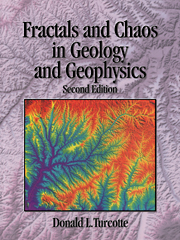Book contents
- Frontmatter
- Contents
- Preface
- Preface to the second edition
- 1 Scale invariance
- 2 Definition of a fractal set
- 3 Fragmentation
- 4 Seismicity and tectonics
- 5 Ore grade and tonnage
- 6 Fractal clustering
- 7 Self-affine fractals
- 8 Geomorphology
- 9 Dynamical systems
- 10 Logistic map
- 11 Slider-block models
- 12 Lorenz equations
- 13 Is mantle convection chaotic?
- 14 Rikitake dynamo
- 15 Renormalization group method
- 16 Self-organized criticality
- 17 Where do we stand?
- References
- Appendix A Glossary of terms
- Appendix B Units and symbols
- Answers to selected problems
- Index
3 - Fragmentation
Published online by Cambridge University Press: 05 June 2012
- Frontmatter
- Contents
- Preface
- Preface to the second edition
- 1 Scale invariance
- 2 Definition of a fractal set
- 3 Fragmentation
- 4 Seismicity and tectonics
- 5 Ore grade and tonnage
- 6 Fractal clustering
- 7 Self-affine fractals
- 8 Geomorphology
- 9 Dynamical systems
- 10 Logistic map
- 11 Slider-block models
- 12 Lorenz equations
- 13 Is mantle convection chaotic?
- 14 Rikitake dynamo
- 15 Renormalization group method
- 16 Self-organized criticality
- 17 Where do we stand?
- References
- Appendix A Glossary of terms
- Appendix B Units and symbols
- Answers to selected problems
- Index
Summary
Background
To illustrate how fractal distributions are applicable to real data sets, we consider fragmentation. Fragmentation plays an important role in a variety of geological phenomena. The earth's crust is fragmented by tectonic processes involving faults, fractures, and joint sets. Rocks are further fragmented by weathering processes. Rocks are also fragmented by explosive processes, both natural and man made. Volcanic eruptions are an example of a natural explosive process. Impacts produce fragmented ejecta. Although fragmentation is of considerable economic importance and many experimental, numerical, and theoretical studies have been carried out on fragmentation, relatively little progress has been made in developing comprehensive theories of fragmentation. A primary reason is that fragmentation involves the initiation and propagation of fractures. Fracture propagation is a highly nonlinear process requiring complex models for even the simplest configuration. Fragmentation involves the interaction between fractures over a wide range of scales. Fragmentation phenomena have been discussed by Grady and Kipp (1987) and Clark (1987). If fragments are produced with a wide range of sizes and if natural scales are not associated with either the fragmented material or the fragmentation process, fractal distributions of number versus size would seem to be expected. Some fractal aspects of fragmentation have been considered by Turcotte (1986a).
Probability and statistics
Clearly the distribution of fragment sizes is a statistical problem. This will also be the case in other applications we will consider. Thus at this point it is appropriate to introduce some of the fundamental concepts of probability and statistics.
- Type
- Chapter
- Information
- Fractals and Chaos in Geology and Geophysics , pp. 28 - 55Publisher: Cambridge University PressPrint publication year: 1997
- 2
- Cited by



